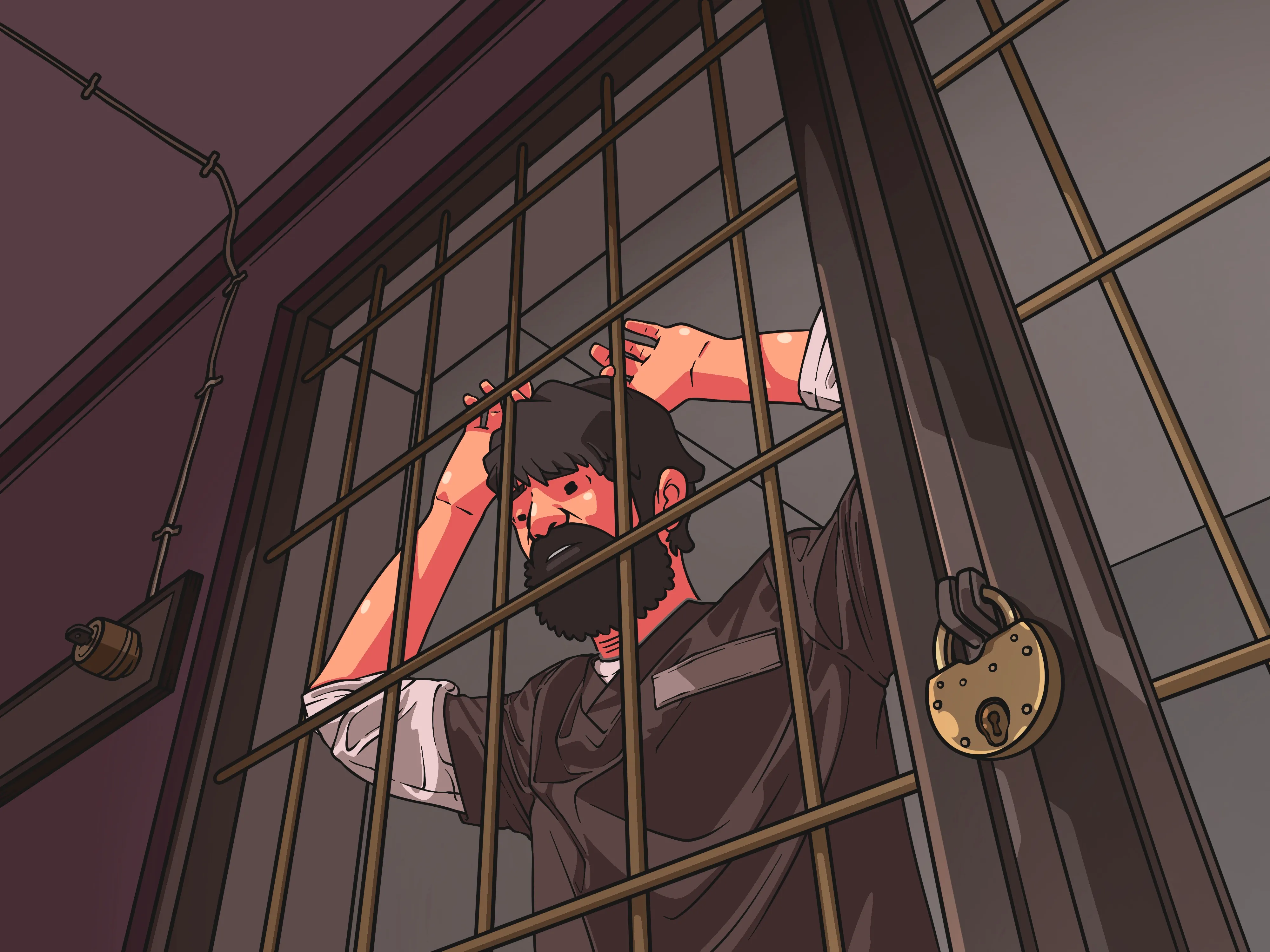
It is perhaps a staggeringly obvious thing to say, but I will never forget the moment I was sent to prison. My barrister had assured me that it was a ‘relatively unlikely’ outcome; but I’d packed a bag, just in case.
‘I am quite convinced there is nothing you need to be taught,’ said the judge, peering over what I assume are the standard issue reading glasses issued to anyone elevated to the bench. My hopes rose. ‘…but I must make an example,’ he continued. Back down came those same hopes. There followed the usual consideration of aggravating and mitigating factors and the arithmetic of credit for a guilty plea. The bottom line: nine months. ‘That’s a good result,’ observed my barrister in the cells of the court half an hour later, ‘you’ll be out in eighteen weeks. It'll pass in a flash.’ I politely demurred: it didn’t feel like a ‘good result,’ and neither did I think the next eighteen weeks likely to pass ‘in a flash.’ Indeed, they did not: rather they were the longest eighteen weeks of my life.
Long though they felt, however, eighteen weeks in custody as a result of a nine-month sentence falls well within the commonly agreed definition of a ‘short sentence’ (anything up to twelve months). Sentences of under twelve months are not uncommon: in 2022 half of sentenced admissions to prison were serving under twelve months, with forty per cent serving under six months (and let’s remember that in most cases that means the time spent in prison will be six months and three months respectively). Indeed the ‘principal offence’ of most of those sentenced to less than twelve months attracted an average sentence length of less than three months (excluding knife possession offences). You might expect, then, given the huge numbers of prisoners serving these ‘short’ sentences that the prison infrastructure would be designed – or at least adapted – to make best use of that time.
From court I was taken to what was then a Category B ‘local’ prison. This was, to put it mildly, a shock to the system. Within a few days, though, a slip was pushed under my door, informing me that I had been classified as a ‘Category D’ prisoner, a category for ‘those who can be reasonably trusted not to try to escape, and are given the privilege of an open prison.’ This seemed to be good news: not something of which there had been an enormous amount since that Friday afternoon in court. So, I spoke to a senior officer on the wing to ask when I might expect to be moved to open conditions. My question was met with a laugh. ‘Eighteen weeks, right? No chance. You’re on the naughty step. Head down, grit your teeth, get through it, get out, don’t come back. The prison will barely have worked out that you’re here in eighteen weeks. I might be able to get you a job in the laundry if you’re interested?’
This is the reality for most people serving a short prison sentence. Our prisons – vastly understaffed, vastly overcrowded – and those who run them are simply trying to keep up with demand for cells; simply trying to accommodate the 43,000 new people we send to them each year and let’s be blunt, simply trying to keep them alive. ‘Purposeful activity’ – that catch-all term for the kind of thing that we hope might result in someone’s rehabilitation – is the exception, not the rule; and the bar for what counts as ‘purposeful’ is low. Very low.
Whether you think short sentences ‘work’ or not depends to an extent on what you think the purpose is of sending someone to prison in the first place. Legally speaking there are five ‘purposes’ of imprisonment: the ‘punishment of offenders’; the ‘reduction of crime (including its reduction by deterrence)’; the ‘reform and rehabilitation of offenders’; the ‘protection of the public’; and ‘the making of reparations’. Each of these is an article in its own right; and so for the rest of the space afforded to me I want to focus on the two of these ‘purposes’ which I think sit at the heart of the list and to consider them through the prism of the young people with whom this magazine is concerned.
These two central purposes are ‘the reform and rehabilitation of offenders’ and the ‘protection of the public’. To a point I think all the others feed into these; and to a point I think the two I have drawn out overlap.
But I should really lay my cards on the table and say that I believe the frequent use of short sentences, especially with regards to young people, represents an abject failure: a failure of the state’s responsibility to those young people themselves, and a failure of the state’s responsibility to wider society. Readers of this magazine are unlikely to require a recitation of the statistics which underpin my assertion; but the headlines are these: of those who leave prison having served a sentence of twelve months or less, the reoffending rate is 63%, a figure which increases again for those who have served six months or less. The highest reoffending rates are for children aged 15-17 released from custody having served twelve months or less. 550 children aged 10-17 were sentenced to custody in the year to March 2022: of those serving a short sentence 70% reoffended within a year. It is not a pretty picture.
And of course, at the pointy end of those statistics are victims: people whom the state has decided to protect for a few short months, and who are then left to fend for themselves when a prisoner is released having served a short sentence, unrehabilitated, unreformed, angry, and desperate. Because the problem is this: the first time we send someone to prison the effect on their future is cataclysmic. The second time, it is incidental. The first time we send someone to prison their future education opportunities are decimated. Their future employment opportunities are severely hampered. They will find it nigh-on impossible to find secure, decent accommodation. And a short sentence is usually just long enough to lose a home (if they have one), a job (if they have one), and a relationship (if they have one). So what are we left with? Well, here’s a good example: someone leaves prison having served a short sentence, aged 20. Somehow, they have managed to emerge without having fallen into a gang, and through sheer strength of character they decide to cut themselves off from the bad influences that led them, however it happened, to prison. Somehow, they have enough money to buy a van and set themselves up cleaning windows. But then they try to get van insurance; and soon discover that because of their recent conviction – any conviction – it is £3,500 a year. This business is the only chance they have to rent somewhere; to begin to put their life back together, and so they chance it and drive without insurance. The end – legitimate employment and the start of a new life – justifies the means, they think. Two months later they have a minor bump, as a result of which it is revealed that they are driving without insurance. Another offence added to their criminal record; perhaps even a recall to prison. And then some of those conversations they had in prison the first time come to mind: offers of illegitimate employment which would pay much better than the legitimate alternative. They’ve tried ‘going straight’ and the hurdles were too high. Their future has been written off anyway, and so suddenly the risk of another prison sentence doesn’t seem that bad – more of an occupational hazard, now. And then we have another young person whose future was written-off by three months in prison, and who, despite their initial efforts, finds that crime is the only thing which will pay. They have also realised that the consequences of getting caught for a second time are much, much less serious than those they have already experienced.
In this example, and in countless others, a young person emerges from a prison that has been incapable of facilitating rehabilitation – they emerge angrier and caring less about their own lives, and the lives of others. As a result, they offend again and again. And so has sending them to prison ‘reformed’ them? No. Has it protected the public? Briefly, but at the cost of endangering them even more post-release. What an astonishing failure.
The alternatives are many and will be well-known to the readership of this magazine. Community sentences, diversion to drug, alcohol, and mental health services, the presumption of the commissioning of a pre-sentence report which can point towards appropriate alternatives to custody (use of which has fallen by 56% over the last decade) – all of these and much, much more are proven to be effective. Tinkering around the edges you might think. I would agree. But change happens incrementally and we face a political climate at present in which we will be lucky even to effect that. We are caught in what Professor Nicola Lacey terms the two main political parties’ ‘prisoners’ dilemma’: an inability – because of the importance of the floating voter – even to discuss the kind of solutions to problems of crime and justice that could be characterised by the opposing party as ‘soft’. Thus we are caught in a death-spiral of populist punitiveness where, as prison is used more and more it becomes less and less effective, reoffending rates go up and up, reconviction rates and consequent prison sentences go up and up, and prison becomes less and less effective.
We must break out of this spiral for the sake of victims, offenders, and society at large. To do so will be a monstrously difficult task. But perhaps the first step, for which I recently called in a letter to The Times, is to press the government to follow through on their 2019 manifesto commitment to launch a Royal Commission into criminal justice. To take the political heat out of the discussion and to have a grown-up, evidence-led discussion is the only way I can see to begin to change a system which fails almost everyone it touches.

Edward Smyth
Writer and Speaker in the Field of Criminal Justice and Faith
www.ersmyth.co.uk
Edward is a writer and speaker in the field of criminal justice and faith. He is a trustee of Sing Inside, Head of Philanthropy for St James’s Church, Piccadilly, and the co-author, with Jonathan Aitken, of ‘Doing Time: A Spiritual Survival Guide’ (Lion Books: 2021). He is also a part-time PhD student in Criminology. Edward served 18 weeks in prison in 2015.
Reference
Statistics taken from the Bromley Briefing– https://prisonreformtrust.org.uk/publication/bromley-briefings-prison-factfile-january-2023/ - Jan 2023, and various Offender Management Statistics Bulletins.